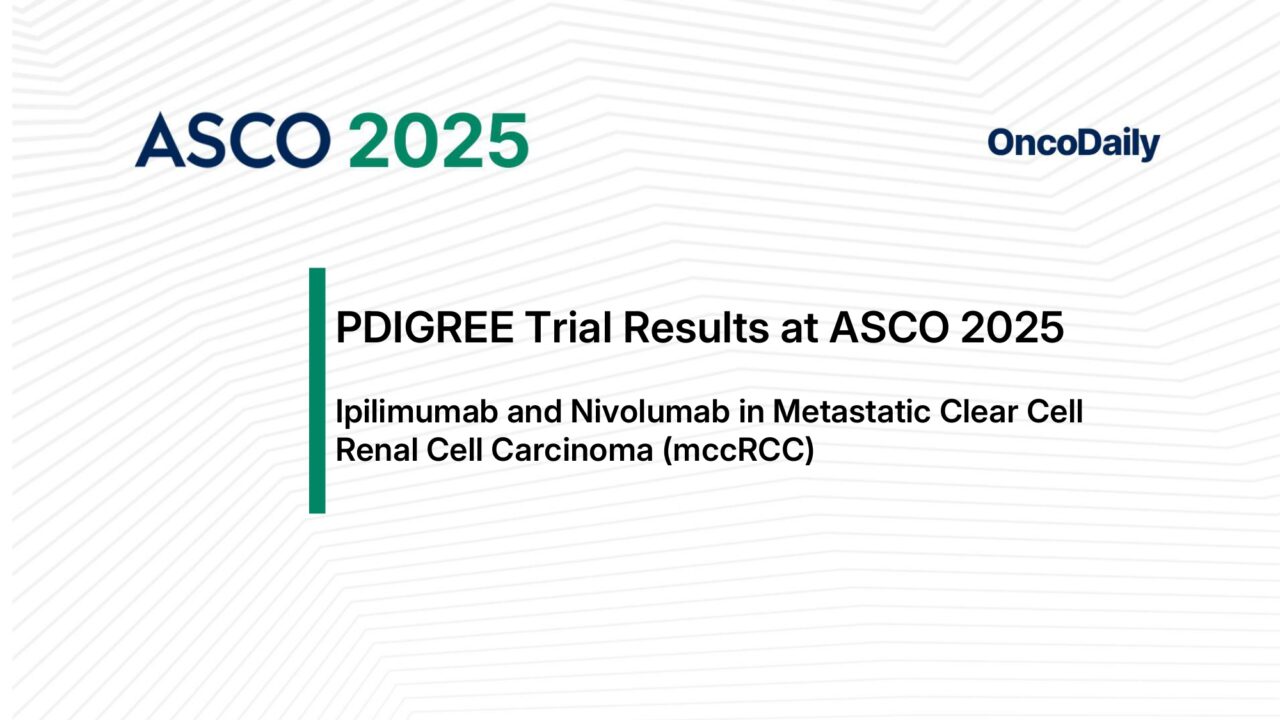The PDIGREE trial (Alliance A031704), a Phase II multicenter study, was presented at ASCO 2025 by Dr. Tian Zhang, MD, MHS, from the Department of Internal Medicine, Division of Hematology and Oncology at UT Southwestern. This trial evaluated a response-adaptive treatment strategy in patients with metastatic clear cell renal cell carcinoma (mccRCC) who received first-line ipilimumab plus nivolumab (ipi/nivo). Designed to mirror real-world clinical practice across academic, regional, and community settings in the United States, PDIGREE provides detailed insights into early treatment outcomes, tolerability, and therapy adjustments based on initial immunotherapy response.
Background
First-line immunotherapy with ipilimumab and nivolumab (ipi/nivo) is a standard approach for patients with intermediate- or poor-risk metastatic clear cell renal cell carcinoma (mccRCC). However, the optimal sequencing and continuation of immunotherapy remain clinically undefined. The PDIGREE (A031704) trial was designed to prospectively evaluate response-adaptive treatment strategies following induction ipi/nivo. This analysis presents real-world demographic data, treatment outcomes from Step 1, and adverse event profiles, offering valuable insights into early treatment decisions in mccRCC.
Methods
PDIGREE enrolled patients with intermediate or poor-risk mccRCC, according to the IMDC criteria, across National Clinical Trials Network (NCTN) sites. All patients received first-line ipi/nivo (Step 1). At 12 weeks, imaging-based response evaluation using iRECIST was conducted to determine the next steps in management
- Complete Responders (CR): Continued nivolumab monotherapy for one year.
- Progressive Disease (PD): Switched to cabozantinib monotherapy.
- Non-CR/Non-PD: Randomized to receive nivolumab with or without cabozantinib.
Patients with unresolved toxicity by week 22 were discontinued from protocol therapy. Only descriptive statistics were used in this interim analysis, and the data do not impact the study’s primary endpoint of overall survival (OS), which remains under investigation.
Study Design
Between May 2019 and May 2024, a total of 1,111 patients were treated with ipi/nivo. Enrollment was stratified by practice setting: academic (A), regional academic (R), and community (C) centers. The target for randomization in Step 2 was 1,175 patients, at which point enrollment was paused. This interim dataset was released with DSMB approval.
Results
Among the 1,111 patients enrolled in Step 1 of the PDIGREE trial, the median age was 64 years, ranging from 29 to 86. A majority of participants were male (73.7%, 819 patients). The racial and ethnic distribution included 85.1% White, 10.4% Hispanic, 4.2% Black, and 1.3% American Indian or Native Hawaiian individuals. Based on IMDC criteria, 76.8% of patients (849) had intermediate-risk disease, while 23.2% (257) were classified as poor risk. Regarding practice settings, 41.2% received treatment at academic centers, 10.2% at regional academic centers, and 48.6% at community centers. De novo metastatic disease was identified in 54.3% of the cohort (603 patients).
Treatment discontinuation during Step 1 occurred in 364 patients (33%), with the following reasons:
- Adverse events (AEs): 160 patients (44%)
- Progressive disease or clinical PD: 46 patients (13%)
- Patient withdrawal: 42 patients (12%)
- Switch to alternative treatments: 39 patients (11%)
- Death during study: 37 patients (10%)
- Other complications or physician decisions: 40 patients (11%)
A total of 15 deaths (1.4%) were attributed to grade 5 serious adverse events (SAEs), with 6 directly linked to disease progression.
Among the 747 patients (67%) who progressed to Step 2 at the 3-month mark:
- Complete responses: Achieved in only 9 patients (1.2%)
- Progressive disease cohort: 141 patients (18.9%)
- Randomization cohort (Non-CR/Non-PD): 597 patients (80%)
Notably, the randomized cohort included significantly fewer patients with poor-risk features (21% vs. 27%, p = 0.01) and fewer with bone metastases (24.5% vs. 34.2%, p = 0.0007), compared to those who discontinued treatment early in Step 1.
Treatment-related grade 3/4 adverse events were observed in 314 out of 1,093 evaluable patients (29%). The most common high-grade toxicities were:
- Diarrhea/colitis: 8%
- Transaminase elevation (hepatotoxicity): 3%
- Rash: 2%
- Adrenal insufficiency: 2%
- Fatigue: 2%
- Hypophysitis: 1%
Key Findings
- High early treatment discontinuation: One-third of patients stopped ipi/nivo within the induction phase, most often due to adverse events.
- Low CR rate: Despite aggressive dual immunotherapy, only 1.2% achieved complete response by 12 weeks.
- Safety profile: Immune-related adverse events occurred in nearly one-third of patients, consistent with prior experience but still significant.
- Real-world representativeness: The study population reflects diverse practice settings and includes a high proportion of community-treated and intermediate-risk patients.
- Selection bias in randomization cohort: Patients proceeding to Step 2 randomization had fewer poor prognostic features than those who discontinued early.
Key Takeaway Messages
- Adverse event management remains critical: Nearly half of treatment discontinuations during Step 1 were due to AEs, reinforcing the need for early toxicity recognition and management strategies.
- PDIGREE shows real-world feasibility of response-adapted immunotherapy: While only a minority achieved CR, the trial successfully stratified patients into rational, biology-driven subsequent therapies.
- Demographic diversity improves generalizability: The inclusion of nearly 49% of patients from community centers ensures that findings reflect broader U.S. practice patterns, not just academic settings.
- Cabozantinib remains a key salvage option: One in five patients with PD transitioned to targeted therapy after early progression on ipi/nivo.
You can read the abstract here.


